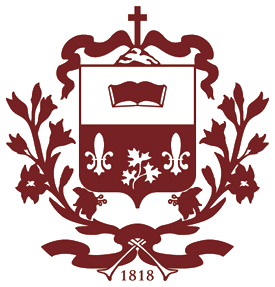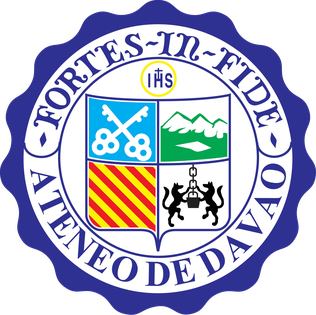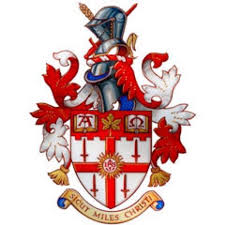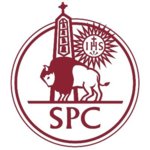
Cape Breton University (CBU) is a public university located in Sydney, Nova Scotia, Canada. It is the only post-secondary degree-granting institution within the Cape Breton Regional Municipality and on Cape Breton Island. The university is enabled by the Cape Breton University Act passed by the Nova Scotia House of Assembly. Prior to this, CBU was enabled by the University College of Cape Breton Act (amended). The University College of Cape Breton's Coat of Arms were registered with the Canadian Heraldic Authority on May 27, 1995.

The University of Manitoba is a public research university in Winnipeg City, Manitoba Province, Canada. Founded in 1877, it is the first university of Western Canada.

The University of St. Michael’s College is federated with the University of Toronto. It was founded in 1852 by the Congregation of St. Basil and retains its Catholic affiliation through its postgraduate theology faculty. However, it is primarily an undergraduate college for liberal arts and sciences.

Lakehead University is a public research university with campuses in Thunder Bay and Orillia, Ontario, Canada. Lakehead University, shortened to 'Lakehead U', is non-denominational and provincially supported. It has undergraduate programs, graduate programs, the Bora Laskin Faculty of Law, the only internationally accredited (AACSB) business school in northern Ontario, and is home to the western campus of the Northern Ontario School of Medicine.

The Université de Saint-Boniface (USB) is a French-language public university located in the Saint Boniface neighbourhood of Winnipeg, Manitoba, Canada. An affiliated institution of the University of Manitoba, the university offers general and specialized university degree programs as well as technical and professional training. In 2014, 1,368 regular students were enrolled. Its Continuing Education Division, which includes a language school, has also counted over 4,200 enrolments.

Loyola University New Orleans is a private Jesuit university in New Orleans, Louisiana. Originally established as Loyola College in 1904, the institution was chartered as a university in 1912. It bears the name of the Jesuit founder, Saint Ignatius of Loyola, and is a member of the Association of Jesuit Colleges and Universities.

Red River College Polytechnic is a college located in Winnipeg, Manitoba, Canada. It is the province's largest institute of applied learning and applied research, with over 200 degree, diploma, and certificate programs, and more than 21,000 students annually.

The University of Winnipeg is a public research university in Winnipeg, Manitoba, Canada. It offers undergraduate programs in art, business, economics, education, science and applied health as well as graduate programs. UWinnipeg's founding colleges were Manitoba College and Wesley College, which merged to form United College in 1938. The University of Winnipeg was established in 1967 when United College received its charter.

All Hallows College was a college of higher education in Dublin. It was founded in 1842 and was run by the Vincentians from 1892 until 2016. On 23 May 2014, it was announced that it was closing because of declining student enrollment. The sale of the campus in Drumcondra to Dublin City University was announced on 19 June 2015 and completed on 8 April 2016. The college closed on 30 November 2016, becoming the All Hallows Campus of Dublin City University.

Brandon University is a university located in the city of Brandon, Manitoba, Canada, with an enrolment of approximately 3,375 (2020) full-time and part-time undergraduate and graduate students. The current location was founded on July 13, 1899, as Brandon College as a Baptist institution. It was chartered as a university by then President John E. Robbins on June 5, 1967. The enabling legislation is the Brandon University Act. Brandon University is one of several predominantly undergraduate liberal arts and sciences institutions in Canada.

University College of the North (UCN)—formerly Keewatin Community College—is a post-secondary institution located in Northern Manitoba, Canada with two main campuses in The Pas and Thompson, respectively. UCN has a student body of approximately 2,400 annually and a staff of approximately 400.

St. John's College is an Anglican-based independent constituent college of the University of Manitoba, located on the university's Fort Garry campus in Winnipeg, Manitoba.

Ateneo de Davao University is a private Catholic basic and higher education institution run by the Philippine Province of the Society of Jesus in Davao City, Davao del Sur, Philippines. It was established in 1948 when the Jesuits took over the administration of the diocesan school, St. Peter's Parochial School. The Jesuits renamed the school to "Ateneo de Davao" after taking control. The Jesuits were naming all the schools that they were opening at that time Ateneo. Ateneo de Davao is the seventh school in the country to be named as Ateneo by the Jesuits. The university has five undergraduate schools, namely the School of Arts and Sciences, School of Business and Governance, School of Engineering and Architecture, School of Education and the School of Nursing. The graduate programs are under these units as well. The College of Law is a separate unit within the university. The university also runs a grade school and high school, both Junior High and Senior High.
Georgian College is a College of Applied Arts and Technology in Ontario, Canada. It has 13,000 full-time students, including 4,500 international students from 85 countries, across seven campuses, the largest being in Barrie.

St. Lawrence College (SLC) is a College of Applied Arts and Technology with three campuses in Eastern Ontario, namely Brockville (1970), Cornwall (1968) and Kingston. It is affiliated with private Alpha College of Business & Technology in Toronto and Canadian College in Vancouver.

St. Paul's High School is a Jesuit Roman Catholic all-boys university preparatory high school in Winnipeg, Manitoba. The school has more than 600 students and has an active alumni community numbering more than 12,000.

The Max Rady College of Medicine is a medical college of the University of Manitoba in Winnipeg and is one of several departments of the university's Rady Faculty of Health Sciences.

Providence University College and Theological Seminary is an interdenominational Evangelical Christian university college and theological seminary located approximately 50 kilometres southeast of Winnipeg in Otterburne, Manitoba.

Calvin Murray Sinclair is a former member of the Canadian Senate and First Nations lawyer who served as chairman of the Indian Residential Schools Truth and Reconciliation Commission from 2009 to 2015. He previously served as a judge in Manitoba from 1988 to 2009, being the first Indigenous judge appointed in the province. Sinclair was appointed to the Senate of Canada on April 2, 2016. In November 2020, he announced his retirement from the Senate effective January 31, 2021.

Higher education in Manitoba includes institutions and systems of higher or advanced education in the province of Manitoba.





















